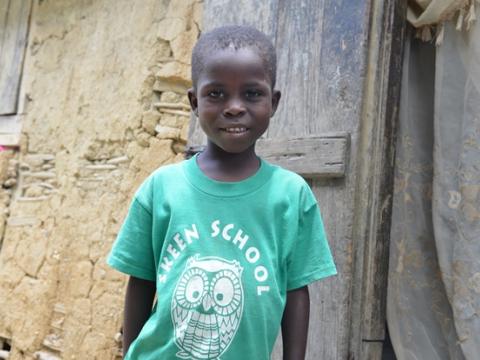5 years after the Haiti earthquake: School feeding program helps children stay in class

When the 7.0 earthquake struck Haiti on January 12, 2010, approximately 220,000 people lost their lives, and millions lost their homes. With more than 800 local staff, 30 years of experience in Haiti, and disaster-relief supplies already in place, World Vision was able to provide help quickly.
Over the last five years, the focus has shifted to reconstruction and long-term development. One of these efforts has been feeding more than 250,000 students through school feeding programmes. Here is a story of how these programmes are helping children stay in school.
The summer sunshine reflecting on his thin face, Doudensky is an energetic seven year old. Sitting in front of the two-sided mud shack where he lives, the boy speaks thoughtfully.
“I can’t wait for school resume so I can eat everyday.”
Doudensky attends second grade at an evangelical school in his town of Cerca Cavajal. There, students are served a meal during break time, provided by the World Food Programme, and managed by World Vision.
“Each [child enrolled at] school receives rice, beans, iodized salt and vegetable oil at an average of 0.165 kg per child,” says Stephania Noel, who has been with World Vision Haiti for four years as a school feeding coordinator.
“Often the food at school is the only meal I have for the day,” explains Doudensky, his voice tinged with emotion as he looks at his father and other members of the family surrounding him.
“I feel very bad about that,” confesses Doudensky’s father, Julien, 53. “But there is not much I can do,” he continues, his eyes flooded by deep emotions.
Julien has always grown maize, beans and bananas to provide food for his family. “Now it’s tough,” he says.
“During the dry season things get worst (sic),” complains the father of eight.
“Sometimes I save half of my food at school that I bring home and share,” admits Doudensky, before his 23 year-old sister Djepha adds, “Because of money, food is an issue in my community.”
Most people grow crops but due to poor irrigation the harvests are poor or even destroyed during heavy rains followed by flooding.
The school feeding programme is very helpful in struggling communities, such as the one where Doudensky and his family live. “There are more registrations in the 269 schools [that are] enrolled in the programme,” says Stephania Noel. “And children stay in class too”, she adds, which is an important side benefit.
Doudensky feels motivated to go to school because he has a dream, and not just because he gets a free meal. “I would like to become a Catholic priest,” he wishes. He has had this dream ever since he received the sacrament of baptism as a little boy.
“If this is God’s will I strongly wish he fulfill his dream,” concludes Julien, while opening his arms.
There is a long way to go before Doudensky will be wearing the cassock. At least there is one thing he is sure about. The seven year-old who is fascinated by reading and writing is in love with school.
See the infographic: World Vision's response to the Haiti earthquake